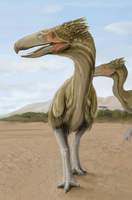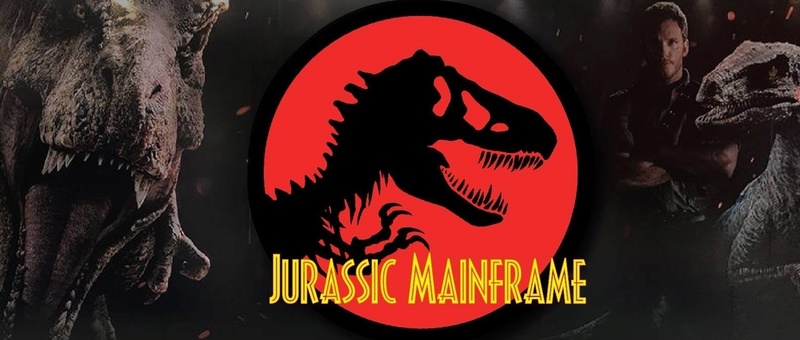| | Ask a paleo question |  |
|
+15JD-man Nathanoraptor DorianGray Océane Spinosaur4.4 Raptor Blue Gojira2014 BarrytheOnyx Tacticool Rex Rhedosaurus Oshronosaurus Aegyptiacus3 SpinoInWonderland Oliphaunt Paleoman 19 posters |
|
| Author | Message |
|---|
Rhedosaurus
Veteran


Posts : 4968
Reputation : 140
Join date : 2016-06-08
Location : Armada, Michigan
 |  Subject: Re: Ask a paleo question Subject: Re: Ask a paleo question  Tue Jul 12, 2016 10:31 am Tue Jul 12, 2016 10:31 am | |
| Another Deinocheirus question. Why did it adapt to being in a role that the theriznosaurs and hadrosaur already occupied? Sheer necessity?
_______________
The undisputed dominant predator of Jurassic Mainframe.
If you don't know history, then you don't know anything. You are a leaf that doesn't know it is part of a tree. Michael Crichton
If you're concerned about where this franchise is headed, then please join us.
| |
|
  | |
DorianGray
Embryo


Posts : 8
Reputation : 0
Join date : 2016-06-27
Location : Check, Desire, Check, Vengeance, Check
 |  Subject: Re: Ask a paleo question Subject: Re: Ask a paleo question  Wed Jul 13, 2016 3:37 pm Wed Jul 13, 2016 3:37 pm | |
| The sediments in the Nemegt formation suggest that it had a lot of resources, and it shows in the animals that live there. From what i can see there were two species of Sauropod, two species of large Hadrosaur, Therizinosaurus and Deinocheirus living in that environment together. Or at least migrating or dying there. My guess is Deinocheirus got that big because the resources were there and they could take advantage of them, and there was enough food in their environment to sustain all these different animals. | |
|
  | |
Rhedosaurus
Veteran


Posts : 4968
Reputation : 140
Join date : 2016-06-08
Location : Armada, Michigan
 |  Subject: Re: Ask a paleo question Subject: Re: Ask a paleo question  Mon Jul 25, 2016 7:19 pm Mon Jul 25, 2016 7:19 pm | |
| Was Alamosaurus the largest titanosaur known to have some form of body armor or is there another one that is larger then it that also has armor?
_______________
The undisputed dominant predator of Jurassic Mainframe.
If you don't know history, then you don't know anything. You are a leaf that doesn't know it is part of a tree. Michael Crichton
If you're concerned about where this franchise is headed, then please join us.
| |
|
  | |
Oliphaunt
Compsognathus


Posts : 112
Reputation : 2
Join date : 2016-06-07
Location : Swimming with Spinosaurs
 |  Subject: Re: Ask a paleo question Subject: Re: Ask a paleo question  Tue Jul 26, 2016 1:26 pm Tue Jul 26, 2016 1:26 pm | |
| Puertasaurus likely had spike-like armor as well, but Alamosaurus is the largest for which we've found them.
_______________
My grandmother dropkicked a fish.
[TFW Characters]
-Shraal (M) Metriacanthosaurus shangyouenis
-Cope (M) Brontosaurus excelsus
-Hook (F): Suchomimus tenerensis
| |
|
  | |
Rhedosaurus
Veteran


Posts : 4968
Reputation : 140
Join date : 2016-06-08
Location : Armada, Michigan
 |  Subject: Re: Ask a paleo question Subject: Re: Ask a paleo question  Sun Jul 31, 2016 12:41 pm Sun Jul 31, 2016 12:41 pm | |
| How well could T. rex see in the dark via night hunting when compared to the raptors and troodonts?
_______________
The undisputed dominant predator of Jurassic Mainframe.
If you don't know history, then you don't know anything. You are a leaf that doesn't know it is part of a tree. Michael Crichton
If you're concerned about where this franchise is headed, then please join us.
| |
|
  | |
Paleoman
Hatchling


Posts : 59
Reputation : 1
Join date : 2016-06-07
Location : Colorado
 |  Subject: Re: Ask a paleo question Subject: Re: Ask a paleo question  Sun Jul 31, 2016 12:47 pm Sun Jul 31, 2016 12:47 pm | |
| As far as I'm aware, there hasn't been any study into archosaurian brain structure and night vision which would be the only good way of assessing and comparing that ability between dinosaurs. Sclerotic rings have been used to gauge night vision potential before but they have never been found with T.rex before. Of course that isn't to say they weren't there, but those bones don't have a high preservation potential especially in something as big as a T. rex. | |
|
  | |
Rhedosaurus
Veteran


Posts : 4968
Reputation : 140
Join date : 2016-06-08
Location : Armada, Michigan
 |  Subject: Re: Ask a paleo question Subject: Re: Ask a paleo question  Sun Jul 31, 2016 12:56 pm Sun Jul 31, 2016 12:56 pm | |
| - Paleoman wrote:
- As far as I'm aware, there hasn't been any study into archosaurian brain structure and night vision which would be the only good way of assessing and comparing that ability between dinosaurs. Sclerotic rings have been used to gauge night vision potential before but they have never been found with T.rex before. Of course that isn't to say they weren't there, but those bones don't have a high preservation potential especially in something as big as a T. rex.
I though there were a few scraps of bone that were thought to be from T. rex, but I don't know which specimen. I asked because if raptors and troodonts could hunt at night, then one would think that T. rex would have been able too. | |
|
  | |
Paleoman
Hatchling


Posts : 59
Reputation : 1
Join date : 2016-06-07
Location : Colorado
 |  Subject: Re: Ask a paleo question Subject: Re: Ask a paleo question  Sun Jul 31, 2016 1:02 pm Sun Jul 31, 2016 1:02 pm | |
| I haven't heard of any, but there definitely could be some out there. That being said I can't think of a reason to imagine Tyrannosaurus couldn't hunt at night. I suppose it's more of a factor of when it primarily did its hunting. | |
|
  | |
Rhedosaurus
Veteran


Posts : 4968
Reputation : 140
Join date : 2016-06-08
Location : Armada, Michigan
 |  Subject: Re: Ask a paleo question Subject: Re: Ask a paleo question  Mon Aug 08, 2016 6:17 pm Mon Aug 08, 2016 6:17 pm | |
| Since Dryptosaurus is regarded as a primitive tyrannosaur, is it closer to the albertosaurines or the tyrannosaurines, or do we simply need more bones to find out?
_______________
The undisputed dominant predator of Jurassic Mainframe.
If you don't know history, then you don't know anything. You are a leaf that doesn't know it is part of a tree. Michael Crichton
If you're concerned about where this franchise is headed, then please join us.
| |
|
  | |
Paleoman
Hatchling


Posts : 59
Reputation : 1
Join date : 2016-06-07
Location : Colorado
 |  Subject: Re: Ask a paleo question Subject: Re: Ask a paleo question  Mon Aug 08, 2016 7:59 pm Mon Aug 08, 2016 7:59 pm | |
| More bones would certainly help, but even more so what would be helpful is a better understanding of the global distribution and variety of Early Cretaceous Tyranosaurs.
The most recent 2016 analysis of Tyrannosauroid systematics used two analytical techniques which each found Dryptosaurus in a different position on the Tyrannosaur family tree. Curiously, the results of both tests are statistically supported within their given framework.
The more traditional test (parsimony analysis) found Dryptosaurus outside of Tyrannosauridae essentially making it eqaully distant from both Tyrannosaurines and Albertosaurines. The other test (Bayesian analysis) found that it was most closely related to the alioramins (eg. Alioramus, Qianzhousaurus), which are themselves members of the Tyrannosaurines.
So, depending on which analysis is correct, Dryptosaurus is either not closer to one or the other, or it is a Tyranosaurine. Confirmation of either hypothesis would need the recovery of more Dryptosaurus material, or more early Cretaceous material to see when and where the Alioramins and other primitive tyrannosaurs were appearing. | |
|
  | |
Rhedosaurus
Veteran


Posts : 4968
Reputation : 140
Join date : 2016-06-08
Location : Armada, Michigan
 |  Subject: Re: Ask a paleo question Subject: Re: Ask a paleo question  Tue Aug 09, 2016 7:54 am Tue Aug 09, 2016 7:54 am | |
| I remember reading that some teeth that were classified as those of Dryptosaurus were found in North Carolina. What are the chances of finding a respectably complete/intact Dryptosaurus skeleton in North Carolina when compared to that of finding one in New Jersey? If Appalachiosaurus being found in northern Alabama happened, then finding another tyrannosaur in another southern state doesn't seem that unlikely to me.
_______________
The undisputed dominant predator of Jurassic Mainframe.
If you don't know history, then you don't know anything. You are a leaf that doesn't know it is part of a tree. Michael Crichton
If you're concerned about where this franchise is headed, then please join us.
| |
|
  | |
Paleoman
Hatchling


Posts : 59
Reputation : 1
Join date : 2016-06-07
Location : Colorado
 |  Subject: Re: Ask a paleo question Subject: Re: Ask a paleo question  Wed Aug 10, 2016 1:59 am Wed Aug 10, 2016 1:59 am | |
| Well, looking into the gross geology of both states, New Jersey has proportionately more Cretaceous rocks than North Carolina. However, NJ is very small, and how the raw areas compare I am not sure.
In the end, I can't say which would be more likely aside from the fact that New Jersey is in Dryptosaurus's known range. That being said, Tyrannosaur species could have large ranges so it certainly wouldn't be out of the question to find good Dryptosaurus material in NC. | |
|
  | |
Rhedosaurus
Veteran


Posts : 4968
Reputation : 140
Join date : 2016-06-08
Location : Armada, Michigan
 |  Subject: Re: Ask a paleo question Subject: Re: Ask a paleo question  Sun Aug 14, 2016 9:30 am Sun Aug 14, 2016 9:30 am | |
| What are the main differences between Albertosaurus and Gorgosaurus and can Gorgosaurus Libratus be reclassified as a species of Albertosaurus?
_______________
The undisputed dominant predator of Jurassic Mainframe.
If you don't know history, then you don't know anything. You are a leaf that doesn't know it is part of a tree. Michael Crichton
If you're concerned about where this franchise is headed, then please join us.
| |
|
  | |
Paleoman
Hatchling


Posts : 59
Reputation : 1
Join date : 2016-06-07
Location : Colorado
 |  Subject: Re: Ask a paleo question Subject: Re: Ask a paleo question  Sun Aug 14, 2016 3:46 pm Sun Aug 14, 2016 3:46 pm | |
| From Phillip Currie: Cranial Anatomy of Tyrannosaurids from Alberta (2003), "there are enough morphological differences to distinguish Albertosaurus from Gorgosaurus," Albertosaurus is more robust, has a "more ventrally oriented occipital condyle than in Gorgosaurus," the braincase box is wider than it is long, which is the opposite of Gorgosaurus, it has a more complex nasal-frontal sutures, among other features.
Also, the most recent evaluation of Tyranosaur systematics from 2016 treats them as distinct, so it seems unlikely that the two will be synonymized. | |
|
  | |
SpinoInWonderland
Hatchling


Posts : 88
Reputation : 7
Join date : 2016-06-09
 |  Subject: Re: Ask a paleo question Subject: Re: Ask a paleo question  Sun Aug 14, 2016 4:12 pm Sun Aug 14, 2016 4:12 pm | |
| - Rhedosaurus wrote:
- can Gorgosaurus Libratus be reclassified as a species of Albertosaurus?
Depends on whether you're a splitter or a lumper. I would lump them but I need more information before I can make a strong opinion about it. _______________  deviantART: http://spinoinwonderland.deviantart.com/ deviantART: http://spinoinwonderland.deviantart.com/
Blog: http://sauropodomorphlair.blogspot.com/ | Imgur: http://spinoinwonderland.imgur.com/
Models | Skins | Mesozoic Revolution | |
|
  | |
Rhedosaurus
Veteran


Posts : 4968
Reputation : 140
Join date : 2016-06-08
Location : Armada, Michigan
 |  Subject: Re: Ask a paleo question Subject: Re: Ask a paleo question  Fri Sep 09, 2016 6:05 pm Fri Sep 09, 2016 6:05 pm | |
| Has any evidence been found of sauropods being vivaporous the way that sharks are?
_______________
The undisputed dominant predator of Jurassic Mainframe.
If you don't know history, then you don't know anything. You are a leaf that doesn't know it is part of a tree. Michael Crichton
If you're concerned about where this franchise is headed, then please join us.
| |
|
  | |
Paleoman
Hatchling


Posts : 59
Reputation : 1
Join date : 2016-06-07
Location : Colorado
 |  Subject: Re: Ask a paleo question Subject: Re: Ask a paleo question  Fri Sep 09, 2016 6:08 pm Fri Sep 09, 2016 6:08 pm | |
| To the best of my knowledge no. Considering that we have found titanosaur eggs and nests, and that they are pretty derived sauropods, it doesn't seem likely that there were viviparous sauropods. | |
|
  | |
Rhedosaurus
Veteran


Posts : 4968
Reputation : 140
Join date : 2016-06-08
Location : Armada, Michigan
 |  Subject: Re: Ask a paleo question Subject: Re: Ask a paleo question  Fri Sep 09, 2016 6:21 pm Fri Sep 09, 2016 6:21 pm | |
| Could any species of dinosaur give birth to live young either outright or be viviparous? I remember how the boneheads where thought to give birth to live young because of how their hips were wider then most bipedal dinosaurs via relation to their body.
_______________
The undisputed dominant predator of Jurassic Mainframe.
If you don't know history, then you don't know anything. You are a leaf that doesn't know it is part of a tree. Michael Crichton
If you're concerned about where this franchise is headed, then please join us.
| |
|
  | |
Paleoman
Hatchling


Posts : 59
Reputation : 1
Join date : 2016-06-07
Location : Colorado
 |  Subject: Re: Ask a paleo question Subject: Re: Ask a paleo question  Fri Sep 09, 2016 6:40 pm Fri Sep 09, 2016 6:40 pm | |
| Well, viviparity has appeared multiple times in reptiles, however no extant birds or crocodiles have the features. That isn't to say it couldn't have appeared in nonavian dinosaurs, but it is unlikely. Darren Naish had this to say on the matter - Spoiler:
"It remains a good and frequently asked question: why haven't birds (and/or crocodilians and/or turtles) evolved viviparity? (viviparity = the ability to retain the egg within the reproductive tract until embryonic development is complete). As Susan notes, viviparity has evolved in just about everything else, in fact in fishes, amphibians and reptiles it has evolved at least 150 times! Several possible answers have been put forward (see Blackburn & Evans 1986): most recently, Andrews & Mathies (2000) argued that the eggshells and oviducts of turtles and birds - unlike those of other reptiles - do not allow much oxygen exchange to occur, and that this might be a constraint that has prevented extended embryonic development in utero, and hence also prevented the evolution of viviparity. Their argument is actually rather more complex than that, but I hope that's an adequate summary. Incidentally, there are no good reasons to think that non-avian dinosaurs (or other fossil archosaurs) were viviparous, so it is likely that this physiological constraint applied to them too."
If that is indeed the case, and archosaurs have physical constraints on their oviducts then it becomes even more unlikely that any dinosaurs gave live birth. | |
|
  | |
Oshronosaurus
Dilophosaurus


Posts : 384
Reputation : 16
Join date : 2016-06-10
 |  Subject: Re: Ask a paleo question Subject: Re: Ask a paleo question  Fri Sep 09, 2016 6:54 pm Fri Sep 09, 2016 6:54 pm | |
| iirc it's thought that Homalocephale (or was it Prenocephale?) had live births _______________ Requiescas in pace, Jurassic Park Legacy. We will never forget you. Rplegacy: Pursue all ambition, ye who enter here!

Join the Brethren! | |
|
  | |
Paleoman
Hatchling


Posts : 59
Reputation : 1
Join date : 2016-06-07
Location : Colorado
 |  Subject: Re: Ask a paleo question Subject: Re: Ask a paleo question  Fri Sep 09, 2016 7:15 pm Fri Sep 09, 2016 7:15 pm | |
| That was proposed as an explanation for their wide hips, but that isn't particularly good evidence. Maybe their hips were reinforced for flank butting behavior, maybe they laid abnormally large eggs, who knows. While it isn't impossible that they might have given live birth, it doesn't seem terribly likely. | |
|
  | |
Oshronosaurus
Dilophosaurus


Posts : 384
Reputation : 16
Join date : 2016-06-10
 |  Subject: Re: Ask a paleo question Subject: Re: Ask a paleo question  Sat Sep 10, 2016 2:24 am Sat Sep 10, 2016 2:24 am | |
| can't say i disagree--that was just the one that stuck out in my memory as "possible live birth in dinosaurs"
i seem to remember hearing something similar about Coelophysis as an alternative explanation of the apparent young of the species inside another (as opposed to cannibalism) but then it turned out that animal was an unrelated lizard iirc _______________ Requiescas in pace, Jurassic Park Legacy. We will never forget you. Rplegacy: Pursue all ambition, ye who enter here!

Join the Brethren! | |
|
  | |
Rhedosaurus
Veteran


Posts : 4968
Reputation : 140
Join date : 2016-06-08
Location : Armada, Michigan
 |  Subject: Re: Ask a paleo question Subject: Re: Ask a paleo question  Mon Sep 19, 2016 5:34 pm Mon Sep 19, 2016 5:34 pm | |
| 2 questions about Bruhathkayosaurus
Were any bones of it ever dug up or were they all lost to monsoon flooding? If they were lost, then why weren't they dug up?
_______________
The undisputed dominant predator of Jurassic Mainframe.
If you don't know history, then you don't know anything. You are a leaf that doesn't know it is part of a tree. Michael Crichton
If you're concerned about where this franchise is headed, then please join us.
| |
|
  | |
SpinoInWonderland
Hatchling


Posts : 88
Reputation : 7
Join date : 2016-06-09
 |  Subject: Re: Ask a paleo question Subject: Re: Ask a paleo question  Mon Sep 19, 2016 10:04 pm Mon Sep 19, 2016 10:04 pm | |
| - Rhedosaurus wrote:
- 2 questions about Bruhathkayosaurus
Were any bones of it ever dug up or were they all lost to monsoon flooding? If they were lost, then why weren't they dug up? 1. They were just left on the ground. 2. Maybe because the whole thing is most likely a fabrication and collecting the "bones" would expose the frauds? http://paleoking.blogspot.com/2012/01/giant-that-never-was-all-your.html _______________  deviantART: http://spinoinwonderland.deviantart.com/ deviantART: http://spinoinwonderland.deviantart.com/
Blog: http://sauropodomorphlair.blogspot.com/ | Imgur: http://spinoinwonderland.imgur.com/
Models | Skins | Mesozoic Revolution | |
|
  | |
Rhedosaurus
Veteran


Posts : 4968
Reputation : 140
Join date : 2016-06-08
Location : Armada, Michigan
 |  Subject: Re: Ask a paleo question Subject: Re: Ask a paleo question  Wed Sep 21, 2016 6:42 pm Wed Sep 21, 2016 6:42 pm | |
| - SpinoInWonderland wrote:
- Rhedosaurus wrote:
- 2 questions about Bruhathkayosaurus
Were any bones of it ever dug up or were they all lost to monsoon flooding? If they were lost, then why weren't they dug up?
1. They were just left on the ground.
2. Maybe because the whole thing is most likely a fabrication and collecting the "bones" would expose the frauds?
http://paleoking.blogspot.com/2012/01/giant-that-never-was-all-your.html Has the paleotological community, whenever it be the establishment-(SVP) or independents (Peter Larson/BHI) tried to demand any answers about more info or tried to find more bones themselves? | |
|
  | |
Tacticool Rex
Embryo


Posts : 8
Reputation : 0
Join date : 2016-06-13
 |  Subject: Re: Ask a paleo question Subject: Re: Ask a paleo question  Sat Sep 24, 2016 9:30 pm Sat Sep 24, 2016 9:30 pm | |
| How accurate is the Carnegie Spinosaurus according to today's standards? | |
|
  | |
Oshronosaurus
Dilophosaurus


Posts : 384
Reputation : 16
Join date : 2016-06-10
 |  Subject: Re: Ask a paleo question Subject: Re: Ask a paleo question  Wed Sep 28, 2016 3:34 am Wed Sep 28, 2016 3:34 am | |
| have there been any soft tissue discoveries in fossils besides that one of Tyrannosaurus? _______________ Requiescas in pace, Jurassic Park Legacy. We will never forget you. Rplegacy: Pursue all ambition, ye who enter here!

Join the Brethren! | |
|
  | |
Rhedosaurus
Veteran


Posts : 4968
Reputation : 140
Join date : 2016-06-08
Location : Armada, Michigan
 |  Subject: Re: Ask a paleo question Subject: Re: Ask a paleo question  Wed Sep 28, 2016 6:18 pm Wed Sep 28, 2016 6:18 pm | |
| - Tacticool Rex wrote:
- How accurate is the Carnegie Spinosaurus according to today's standards?
The back legs need to be at least 25% shorter and the arms at least 20% longer and more robust, but other then those simple changes, it looks fairly accurate given what we know. - Oshronosaurus wrote:
- have there been any soft tissue discoveries in fossils besides that one of Tyrannosaurus?
This is the best I can think of. http://news.nationalgeographic.com/2016/06/dinosaur-bird-feather-burma-amber-myanmar-flying-paleontology-enantiornithes/ | |
|
  | |
Paleoman
Hatchling


Posts : 59
Reputation : 1
Join date : 2016-06-07
Location : Colorado
 |  Subject: Re: Ask a paleo question Subject: Re: Ask a paleo question  Wed Sep 28, 2016 11:34 pm Wed Sep 28, 2016 11:34 pm | |
| I actually just saw a poster at the Geologic Society of America conference that reported the extraction of structures similar to what has been seen in T.rex. These were extracted from unidentified bone chunks that are probably from a hadrosaur. | |
|
  | |
Rhedosaurus
Veteran


Posts : 4968
Reputation : 140
Join date : 2016-06-08
Location : Armada, Michigan
 |  Subject: Re: Ask a paleo question Subject: Re: Ask a paleo question  Wed Nov 02, 2016 3:21 pm Wed Nov 02, 2016 3:21 pm | |
| Has the paleo community tried to establish how complete and/or how many bones a specimen must be to be a holotype/neotype? I ask because the amount of fossil material for the Dakotaraptor holotype is kind of...lacking. I thought that it would have at least have had a partial skull found yet, there isn't. It just feels like with Dakotaraptor then the people who described it made the same mistake that Jorner and others did with Spinosaurus in the very late 1990's-early 2000's.
_______________
The undisputed dominant predator of Jurassic Mainframe.
If you don't know history, then you don't know anything. You are a leaf that doesn't know it is part of a tree. Michael Crichton
If you're concerned about where this franchise is headed, then please join us.
| |
|
  | |
Sponsored content
 |  Subject: Re: Ask a paleo question Subject: Re: Ask a paleo question  | |
| |
|
  | |
| | Ask a paleo question |  |
|








